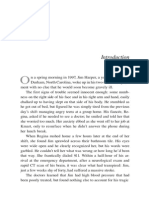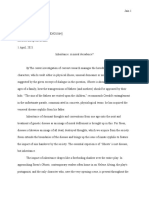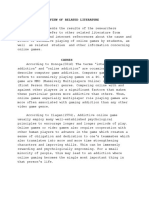Character of Oswald Alving
Character of Oswald Alving
Uploaded by
Red ApocalypseCopyright:
Available Formats
Character of Oswald Alving
Character of Oswald Alving
Uploaded by
Red ApocalypseOriginal Description:
Copyright
Available Formats
Share this document
Did you find this document useful?
Is this content inappropriate?
Copyright:
Available Formats
Character of Oswald Alving
Character of Oswald Alving
Uploaded by
Red ApocalypseCopyright:
Available Formats
Oswald has a lot in common with Henrik Ibsen, the author of Ghosts.
Oswald is from Norway but lives in the South
(Paris). Ibsen lived in Rome for most of his life, though he continued to write about his homeland. He loathed what he
considered the small-minded and puritanical outlook of his countrymen – and they loathed him back, especially when
it came to Ghosts. Ibsen himself was an iconoclast, meaning he freely expressed his rejection of accepted ideas and
institutions. His spokesperson here is Oswald, a non-conformist and an artist struggling to defend his identity in the
hostile, judgmental environment of his home.
Oswald is a straight shooter. While Pastor Manders and Mrs. Alving often beat politely around the bush, Oswald says
what he means. In his first appearance, he chats with Manders for only a couple minutes before he’s speaking his
mind in defence of unconventional romantic relationships. He gets worked up as he recalls the hypocrite husbands
who treat artists’ quarters like they are brothels. Then he remembers where he is and apologizes: “Excuse me, Pastor:
I know you can’t take my point of view; but I couldn’t help speaking out”.
Oswald is also merciless with his mother. He rejects her maternal sentimentality. In Act 3, he’s just told her that a) he
doesn’t love his father, and b) he doesn’t love her. Oswald doesn’t accept the idea that just because he came from
Mrs. Alving’s womb he owes her something. There’s that rejecting-accepted- ideas thing again. He asks why should
love her? He didn’t grow up living with his parents, he doesn’t know them, and coming home is just depressing. He’d
rather be in Paris. When Mrs. Alving redoubles her efforts to win his heart, he asks her to stop talking about it, since
he has other things on his mind..
Oswald’s painfully honest communication style is appropriate to his function in the play. His return to home forces
Mrs. Alving to confront the truth of her life. She wants to bury her past – and by her past we mean the memory of her
alcoholic, philandering husband – but she just can’t. The past lives in the present. If she didn’t have her rose-coloured
maternal glasses on, she would recognize that fact when Oswald comes down smoking the pipe in Act 1. He’s Captain
Alving all over again, as Manders recognizes: “there is an expression about the corners of the mouth-something about
the lips – that reminds one exactly of Alving: at any rate, now that he is smoking”.
If Pastor Manders is the representative of law, order, and society, Oswald is the representative of unruly life and
passion. Joie de Vivre. The Joy of Life, or Livsglede in Dano-Norwegian. Personal freedom. Choosing your destiny.
When Oswald paints a picture of this free, happy life, Mrs. Alving suddenly understands what her husband lacked,
why he went so far downhill in the gloomy, duty-bound life of the North. He was suffocated and paralyzed – and under
her control.
No one ever says the word “syphilis” in this play, but that’s what Oswald’s got. It’s a sexually transmitted disease that
can also pass from a mother to a baby. It doesn’t make sound medical sense that Oswald got it from his father – but
Ibsen is most interested in the metaphor: “The sins of the fathers are visited upon the children”. The kind of syphilis
Oswald seems to have is “tertiary” or “latent” syphilis. It’s been dormant in his body and is just emerging, causing the
headaches and fatigue he complains about. Untreated (or treated too late), it can result in serious organ and nerve
damage, paralysis, muscle deterioration, blindness, and dementia. Oswald is more colourful in his description of the
illness; his doctor calls it “a sort of softening of the brain – or something like that. [Smiles sadly.] I think that
expression sounds so nice. It always sets me thinking of cherry-coloured velvet – something soft and delicate to
stroke”. Oswald’s decline means that Mrs. Alving has to let go of the final “ghost” in her life- her attachment to her
son.
You might also like
- Black Man in A White Coat: A Doctor's Reflections On Race and MedicineDocument8 pagesBlack Man in A White Coat: A Doctor's Reflections On Race and MedicineEmma-Jean WeinsteinNo ratings yet
- Significance of The Title Ghosts'Document2 pagesSignificance of The Title Ghosts'Sabyasachi Mukherjee50% (4)
- COMPLETE What Ghosts and Impt of TitleDocument3 pagesCOMPLETE What Ghosts and Impt of TitleKazuma SatoNo ratings yet
- Use of Symbols in GhostsDocument1 pageUse of Symbols in Ghostssandip pandeyNo ratings yet
- Soap Note1 - Gyn ComplaintDocument6 pagesSoap Note1 - Gyn Complaintapi-482726932100% (3)
- Oswald The Iconoclast / Character Analysis: Oswald AlvingDocument2 pagesOswald The Iconoclast / Character Analysis: Oswald AlvingSabyasachi MukherjeeNo ratings yet
- The Tragedy of Mrs. Alving in Henrik Ibsen's Ghosts / Character of Mrs. AlvingDocument2 pagesThe Tragedy of Mrs. Alving in Henrik Ibsen's Ghosts / Character of Mrs. AlvingSabyasachi MukherjeeNo ratings yet
- MrsalvingDocument17 pagesMrsalvingsurbhi sabharwalNo ratings yet
- Assignment DramaDocument6 pagesAssignment DramaWasif ilahiNo ratings yet
- Henrik Ibsen Is One of The WorldDocument4 pagesHenrik Ibsen Is One of The WorldElham AzherNo ratings yet
- Character Sketch of Mrs AlvingDocument1 pageCharacter Sketch of Mrs AlvingSauhardya RitNo ratings yet
- Critically Analyse The Character of Mrs Alving As A Critic of Conventional SocietyDocument5 pagesCritically Analyse The Character of Mrs Alving As A Critic of Conventional SocietyPrakhar DobhalNo ratings yet
- The Tragedy of Mrs. Alving in Henrik IbsDocument2 pagesThe Tragedy of Mrs. Alving in Henrik Ibssandip pandeyNo ratings yet
- Significance of The Title Ghosts by Henrik IbsenDocument3 pagesSignificance of The Title Ghosts by Henrik IbsenPremNo ratings yet
- Symbolism in "Ghosts" by IbsenDocument2 pagesSymbolism in "Ghosts" by IbsenSabyasachi MukherjeeNo ratings yet
- Ayushi Jain (1064) - IbsenDocument5 pagesAyushi Jain (1064) - IbsenpankhuriNo ratings yet
- Adeeba Siddiqui - MEDDocument3 pagesAdeeba Siddiqui - MEDAdeeba SiddiquiNo ratings yet
- Tragedy and Tradition: Ibsen and Nietzsche On The Ghosts of The Greeks (Kristin Gjesdal)Document23 pagesTragedy and Tradition: Ibsen and Nietzsche On The Ghosts of The Greeks (Kristin Gjesdal)Tal SaarNo ratings yet
- Good Thesis Statements For Edgar Allan PoeDocument8 pagesGood Thesis Statements For Edgar Allan Poetracyhuangpasadena100% (4)
- 162638copy of GhostsDocument16 pages162638copy of Ghostsramapatichakra666No ratings yet
- It Might Have Been What He Said: A NovelFrom EverandIt Might Have Been What He Said: A NovelRating: 3 out of 5 stars3/5 (12)
- Discuss The Play Ghost As A Domestic PlayDocument1 pageDiscuss The Play Ghost As A Domestic Playinformaluse47No ratings yet
- Discuss Ibsen Ghosts As A Play of Ethical Rather Than Physical Debility.Document1 pageDiscuss Ibsen Ghosts As A Play of Ethical Rather Than Physical Debility.informaluse47No ratings yet
- ALICE'S RING: One of the Most Haunted Romances in South CarolinaFrom EverandALICE'S RING: One of the Most Haunted Romances in South CarolinaNo ratings yet
- And the Wolves Howled: Fragments of two lifetimesFrom EverandAnd the Wolves Howled: Fragments of two lifetimesRating: 2 out of 5 stars2/5 (1)
- Henrik Ibsen's GhostDocument3 pagesHenrik Ibsen's Ghostrashedmondal2001No ratings yet
- Edgar Allan PoeDocument9 pagesEdgar Allan PoeMaría Teresa Fdez BlancoNo ratings yet
- Ghosts by Henrik IbsenDocument28 pagesGhosts by Henrik IbsenTama MartinNo ratings yet
- текст анализDocument2 pagesтекст анализRegina ApsalyamovaNo ratings yet
- GhostsnotesDocument15 pagesGhostsnotesBidisha DuttaNo ratings yet
- Vampire Romance: Silver and Sleek: Secret Blood Gate World Series (Paranormal Vampire New Adult Contemporary Romance)From EverandVampire Romance: Silver and Sleek: Secret Blood Gate World Series (Paranormal Vampire New Adult Contemporary Romance)No ratings yet
- OpowiesciDocument149 pagesOpowiesciOlmo LejosNo ratings yet
- Environment and Heredity in Ibsen's GhostsDocument3 pagesEnvironment and Heredity in Ibsen's GhostsBiplab PaulNo ratings yet
- Save Her: A Gripping Psychological Thriller Full of TwistsFrom EverandSave Her: A Gripping Psychological Thriller Full of TwistsRating: 4 out of 5 stars4/5 (5)
- The Birth and Times of Mr. Dystopia: The Chronicles of Monkeytown, #1From EverandThe Birth and Times of Mr. Dystopia: The Chronicles of Monkeytown, #1No ratings yet
- The Total Emasculation of the White ManFrom EverandThe Total Emasculation of the White ManRating: 4 out of 5 stars4/5 (1)
- "The Oval Portrait" by Allan PoeDocument2 pages"The Oval Portrait" by Allan PoeMi Guel VergaraNo ratings yet
- Guinea CDR AnalysisDocument50 pagesGuinea CDR Analysisalemayehu.w.teferaNo ratings yet
- Online MedEd For Bioethics, Biostats, EtcDocument2 pagesOnline MedEd For Bioethics, Biostats, EtcjohntheuglyllamaNo ratings yet
- Word Parts Dictionary ADocument27 pagesWord Parts Dictionary AJosh Flynn100% (1)
- Go PDFDocument12 pagesGo PDFominonaxanonimoNo ratings yet
- B. InggrisDocument9 pagesB. InggrisKDA nimeNo ratings yet
- Management Principles For Health Professionals 7th Edition Ebook PDFDocument61 pagesManagement Principles For Health Professionals 7th Edition Ebook PDFmaria.bowman208100% (55)
- Maxillary Sinus in Health and DiseaseDocument36 pagesMaxillary Sinus in Health and Diseasedaw022No ratings yet
- Grady EMS Drug List 2017 FINALDocument20 pagesGrady EMS Drug List 2017 FINALThomas LeachNo ratings yet
- Fronda - CMB - PPT - Protein TraffickingDocument13 pagesFronda - CMB - PPT - Protein TraffickingJericho D. FrondaNo ratings yet
- 2011 @dentallib John Beumer III, Mark T Marunick, Salvatore J Esposito-171-229Document139 pages2011 @dentallib John Beumer III, Mark T Marunick, Salvatore J Esposito-171-229TariqNo ratings yet
- Care of Clients With Problems in Cellular Aberrations Key TermsDocument2 pagesCare of Clients With Problems in Cellular Aberrations Key Termsjoyrena ochondraNo ratings yet
- Fasting Enhances Cancer TherapyDocument9 pagesFasting Enhances Cancer TherapyNurul Dwi Utami100% (1)
- TF r013 Section 15-09 SSCP Rev 1Document44 pagesTF r013 Section 15-09 SSCP Rev 1mamdouhultramedumicNo ratings yet
- Brain Stem Death: Learning ObjectivesDocument4 pagesBrain Stem Death: Learning ObjectivesFarizNo ratings yet
- Emb MCQ 5Document4 pagesEmb MCQ 5Tofik MohammedNo ratings yet
- Condylomata AcuminataDocument10 pagesCondylomata Acuminataalejandro fernandezNo ratings yet
- Manual Association Splitting English 2022aDocument22 pagesManual Association Splitting English 2022aNotSoMerryMeezNo ratings yet
- Question 1 of 6: Match The Correct Image of The Type of Feeding Tube To The Patient SituationDocument53 pagesQuestion 1 of 6: Match The Correct Image of The Type of Feeding Tube To The Patient SituationronjginaNo ratings yet
- Differentiate Between: Defibrillation CardioversionDocument3 pagesDifferentiate Between: Defibrillation CardioversionStephy SojanNo ratings yet
- Maize QC Trainig GuidelineDocument84 pagesMaize QC Trainig GuidelineMelikteNo ratings yet
- E Nursing LFDDocument2 pagesE Nursing LFDAlhadzra AlihNo ratings yet
- Review of Related LiteratureDocument8 pagesReview of Related LiteratureJose LubuganNo ratings yet
- Alt Half-Dragon TemplateDocument6 pagesAlt Half-Dragon TemplateTony Holcomb100% (2)
- Book Genetics Plant Breeding and EvolutionDocument86 pagesBook Genetics Plant Breeding and EvolutionIrena CalicNo ratings yet
- UntitledDocument193 pagesUntitledRianna MariaNo ratings yet
- Cop Mt6319lec 1T 2023-2024Document36 pagesCop Mt6319lec 1T 2023-2024lanceferdinand.tan.pharmaNo ratings yet
- HyphemaDocument13 pagesHyphemaSheira T. TayebNo ratings yet
- Bact-M10 1Document10 pagesBact-M10 1VICENCIO, SHANELE B.No ratings yet

























































































